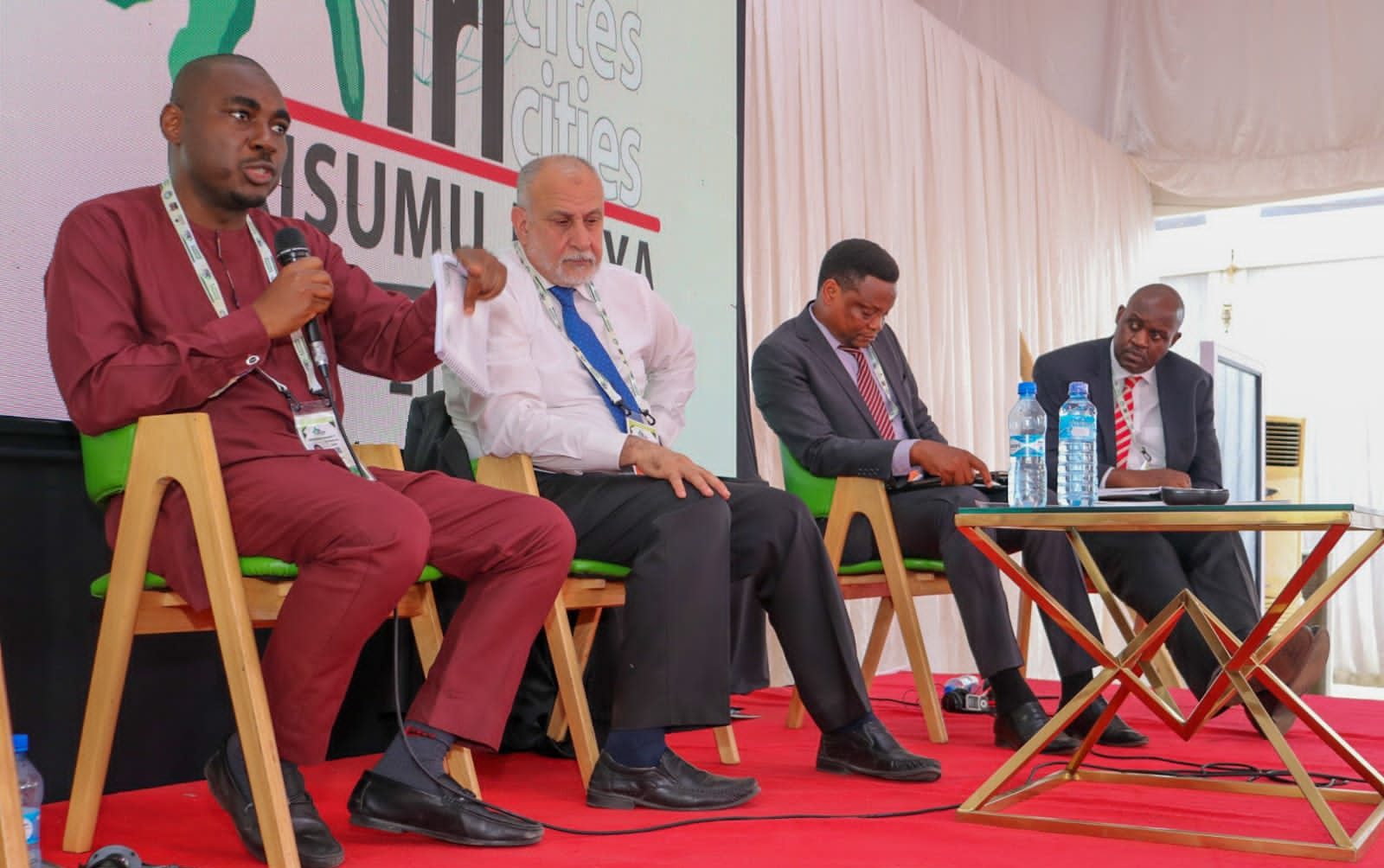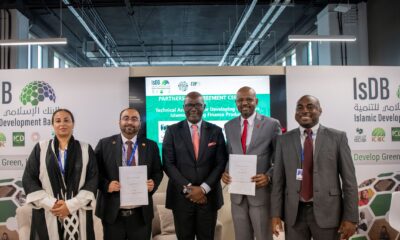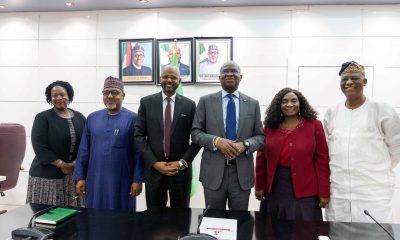Economy
Fast-track urbanization to spur growth, shelter Afrique urges African Countries

Shelter Afrique Head of Policy, Research and Partnerships Dr. Muhammad Gambo leading a panel discussion on financing Urban development at the 9th Africities Conference in Kisumu. With him are (from left to right) Dr. Kamal Ben Amara, Mayor of Bizerta, Tunisia; Hashting Chikoko Regional Director, Africa at C40 Cities; and Kevin Ouko, Director of Corporate Banking at Ecobank. (Photo: Supplied).
Pan- African housing and urban development financier, Shelter Afrique has urged African countries to fast-track urbanization to stimulate economic development across the continent.
Speaking at the 9th Africities Conference held in Kisumu, Kenya between 17-21 May, 2022 and attended by over 11,000 people, including 8,000 official delegates from across Africa and globally, Shelter Afrique’s Head of Policy, Research and Partnerships Dr. Muhammad Gambo said urbanization could play a major role in economic and social progress, if well managed.
“No country has grown to middle income without industrializing and urbanizing and none has grown to high income without vibrant cities. China, for instance, is widely held up as an example of how urbanization can fuel industrialization and transform living standards. This is why we strongly believe African countries should put more emphasis on effective urbanization if they intend to lift their people out of mass poverty, and doing so, fast,” Dr. Gambo said.
A report by the Organization for Economic Co-operation and Development (OECD), Africa’s Urbanisation Dynamics 2020: Africapolis, Mapping a News Urban Geography”, the pace of urbanization and urban population growth in Africa has changed significantly across the continent generally as well as within its various regions.
According to the report, Africa’s urbanization rate will continue to grow among the fastest of the world regions in the coming years as its population grows, which is expected to double by the year 2050.
“We urge policymakers across the continent to enact policies that will encourage urban growth modeled around economic development and poverty eradication,” Dr. Gambo said.
Dr. Gambo, however, noted that funding urban growth still remains a formidable challenge for many countries, but believes it’s achievable.
“Shelter Afrique recently completed a debut ₦46 billion (US$110.7 million) Series 1 Fixed Rate Senior Unsecured Bond Issuance in Nigeria’s capital market under its ₦200 billion (US$481.3 million) bond issuance programme for housing and urban development in Nigeria. This issue was 60.7% oversubscribed, meaning there is an appetite for such bonds, not only in Nigeria but also in other countries like Kenya, South Africa, Morocco, etc. What African countries need is the know-how to create financial ecosystems that can support the mobilization of municipal and subnational finances for urban infrastructure development,” Dr Gambo said.
The African Development Bank estimates that the continent’s infrastructure financing needs will be as much as US$170 billion a year by 2025, with an estimated gap of around US$100 billion a year.
Africities is a Pan Africa conference that is convened by the United Cities and Local Governments of Africa’s (UCLG-A) and brings together the leadership of cities and sub-national governments and their associations for the advancement of decentralization and local governance aimed at improving the living standards of the citizens. This year’s conference discussed the role of Intermediary Cities of Africa in the Implementation of Agenda 2030 of the United Nations and the African Union Agenda 2063.
Economy
Meta Hosts its First Youth Summit in Nigeria to Drive Innovation and Empowerment

Meta recently hosted its first Youth Summit in Lagos, Nigeria, bringing together over 200 young professionals, students, recent graduates, creatives, tech enthusiasts and aspiring entrepreneurs.
Themed ‘Empowering Youth Through Technology, Innovation and Entrepreneurship’, the summit included a series of thought-provoking panel discussions, a mentoring session and an interactive workshop designed to equip young Nigerians with the skills, insights and networks needed to thrive in today’s tech-driven world.
Commenting about the event, Phil Oduor, Head of Policy Programs, Sub-Saharan Africa said, “At Meta, we believe that today’s youth are tomorrow’s change-makers. Through initiatives like the Youth Summit, we aim to foster innovation, promote digital literacy and empower young Nigerians with the tools and opportunities to realise their potential and contribute to Nigeria’s growing digital economy.”
Delivering the keynote address, Femi Aluko, CEO/Co-Founder, Chowdeck, shared his journey of breaking barriers to achieve success in tech. He encouraged attendees to embrace the limitless opportunities within today’s technology ecosystem.
A panel discussion, led by Chinny Francis, Public Policy Manager at Meta, featured panellists Nifemi Akinwamide, Head of Operations, Alt School; Adaora Mbelu, Co-Founder of Lumination Global and Obaloluwa Adeagbo, Marketing Lead at Talstack. They shared valuable insights about the future of work, emphasising the importance of storytelling to build a personal brand, practicing self-awareness, developing soft skills, lifelong learning and honing problem-solving skills to thrive in a digitally transformed world.
Francis Sani, Technical Adviser for Innovation, Entrepreneurship & Capital at the Federal Ministry of Communications, Innovation & Digital Economy, spoke at the event. He highlighted the 3 Million Technical Talent (3MTT) program, emphasising that the program aims to build Nigeria’s technical talent backbone to drive the digital economy and position Nigeria as a net talent exporter. He encouraged youth to take advantage of this opportunity.
Another panel of industry experts took the stage during the ‘Lunch and Learn: Navigating Entrepreneurship in a Rapidly Changing Landscape’ session, moderated by Sade Dada, Head of Public Policy for Anglophone West Africa at Meta. Seye Bandele, CEO of PaidHR and Damilola Teidi-Ayoola, Head of Platform and Networks at Ventures Platform Fund, shared their invaluable insights. Seye highlighted the importance of grit, curiosity and candour, while Damilola reinforced the need to understand one’s target audience, deliver value through their business and embrace data-driven decision-making in the dynamic entrepreneurial landscape.
The event also featured inspiring conversations with leading figures in the creative industry. Miss Techy, an award winning tech content creator and Salem King, a creator, storyteller, author and speaker, shared their experiences and advice on achieving long-term success. Attendees also benefited from an interactive workshop and a mentoring session, where industry experts shared practical advice and strategies for entrepreneurs and tech enthusiasts.
Meta’s Youth Summit 2024 highlights a commitment to driving positive change, championing youth empowerment and advancing economic opportunities in Nigeria. Through investments in key areas—such as the creative industry, digital literacy, economic impact and youth job training—Meta is dedicated to empowering young Nigerians to thrive in today’s tech-driven world.
Cross-section of some of the attendees at the Meta Youth Summit 2024 in Lagos
L-R: Chinny Francis, Public Policy Manager, Meta; Nifemi Akinwamide, Head of Operations, Alt School; Adaora Mbelu, Co-Founder of Lumination Global and Obaloluwa Adeagbo, Marketing Lead at Talstack.
L-R: Sade Dada, Head of Public Policy, Anglophone West Africa, Meta; Damilola Teidi-Ayoola, Head of Platform and Networks, Ventures Platform Fund, and Seye Bandele, Chief Executive Officer, PaidHR during the Lunch and Learn: Navigating Entrepreneurship in a Rapidly Changing Landscape panel session.
Salem King, a creator, storyteller, author and speaker and Miss Techy, an award winning tech content creator
During a mentoring session workshop
Femi Aluko, Chief Executive Officer and Co-founder, Chowdeck.
Francis Sani, Technical Adviser to the minister of communications and digital economy of Nigeria
Economy
Tosin Eniolorunda: Fighting fraud related issues in financial ecosystem requires collaboration

Nigeria’s financial system has come under renewed scrutiny against the backdrop of the increase in the value of electronic payment transactions in Q1 2023 and the challenges posed by bad faith actors who exploit gaps in the payment systems even as Nigerian financial institutions have reported ₦159 billion ($201.5 million) lost to fraud since 2020. There is a need for all players in the financial services sector to come together in tackling these challenges.
Group CEO, Moniepoint Inc., Tosin Eniolorunda during a courtesy visit to the Chief Executive Officer, Fidelity Bank, Nneka Onyeali-Ikpe in Lagos. Onyeali-Ikpe, who welcomed the Moniepoint boss, used the opportunity to reaffirm her bank’s appreciation for the patience and understanding demonstrated during its banking channel integration optimization which resulted in service disruptions and the inability of Moniepoint customers to receive financial inflow.
It will be recalled that Fidelity Bank had recently announced to its customers and the general public, the resumption of interbank transfers to all licensed financial institutions in the country. This was following speculative reports from various media publications that the bank had imposed transaction restrictions on some neo banks operating in the country.
During conversations around the growth of the digital payments segment and contributions of the financial services to Nigeria’s socio-economic development, Tosin Eniolorunda used the occasion to stress the point that Moniepoint as a responsible and compliant organization takes customer KYC very seriously. “KYC is not merely an acronym but indeed a cornerstone in establishing trust, ensuring security, and complying with regulatory standards. All accounts created on our platform have BVN verification and in addition to this we perform a liveliness check at the point of onboarding. This is a comparison of the account holder’s life picture and the BVN image as a way to reduce impersonation,” Eniolorunda maintained.
He continued, “we have zero tolerance for fraud and typically go all out to ensure that we track fraudsters and fraudulent transactions on our platforms. We have deployed and utilize robust fraud detection systems and technologies that can analyze patterns, identify anomalies, and detect suspicious activities in the system. As such we are better empowered to identify potential fraud incidents and trigger alerts for further investigations and remedial actions.”
As partners in deepening the CBN’s mandate of ensuring provision of adequate and convenient financial services to consumers and guaranteeing their protection as well as the various undercurrents in the financial services industry, Moniepoint and Fidelity agreed to work closely together to develop a tightly knit mechanism to stem the menace of fraudulent transactions and collaboratively push through in addressing payment challenges in the country.
Economy
Angola becomes ATI’s 21st Member State, pays USD25m in capital subscription fees

The Republic of Angola has become the 21st African Member State and the 1st Lusophone Member State of pan-African insurer, Africa Trade Insurance Agency – ATI, after paying a capital subscription of USD25 million. The membership was funded the Angolan National Treasury resources and proceeds from the landmark BITA water project – a strategic public investment for the construction of infrastructure for the treatment, supply and storage of drinking water that will benefit 2.5 million people in Angola.
Welcoming Angola’s membership, ATI’s Chief Executive Officer, Manuel Moses, noted the country’s demonstration of its commitment to diversify its economy through ATI’s trade and investment risk mitigation solutions.
“We are happy to support Angola in its quest to economic diversification and becoming an agricultural powerhouse on the African continent. Angola’s membership is timely as ATI’s risk mitigation and credit enhancement services will act as a catalyst for strengthening and diversifying Angola’s economy, supporting both increased investment, exports and trade under Africa’s continental framework of the AfCFTA,” Mr. Manuel said.
Under this one of a kind blended finance and guarantee innovative structure, the Republic of Angola – along with the lenders covered by ATI under the transaction – agreed for the use of proceeds under the syndicated loan to also include the financing for the purpose of Angola becoming a member of ATI. ATI provided guarantee and insurance support for this World Bank’s partially guaranteed facility to the Government of Angola for the expansion and improvement of water supply service in the urban and peri-urban belts of Luanda.
Current exposure
ATI’s gross exposure in Angola, the largest country in Southern Africa Region, currently stands at USD467M mainly in construction, energy & gas, trade & transport, water supply and wholesale & retail sectors, with transactions valued at USD1.4B.
“This development was made possible because of ATI’s pan African mandate that allows the organization to cover transactions in Angola and beyond, despite ATI non-membership. Now that Angola is a fully-fledged shareholder of ATI, the country can fully access more of ATI’s guarantee solutions to attract more Foreign Direct Investments and boost its internal and external trade across the region,” Mr. Manual explained.
Angola’s economy is mainly driven by its oil sector but the country seeks to pursue new growth models for economic diversification through the agricultural sector and private sector development.
With ATI’s support, Angola is on the path to fiscal consolidation, manage their debt ceiling, increase in public and private investment, in order to resume the ascending curve of sustainable and inclusive economic growth as well as human development.
ATI has grown from a small African start-up in 2001 into a pan-African institution with presence across Africa and with a significant global reach. Besides Angola, other member countries include Benin, Burundi, Cameroon, Côte d’Ivoire, Democratic Republic of Congo, Ethiopia, Ghana, Kenya, Madagascar, Malawi, Niger, Nigeria, Rwanda, Senegal, South Sudan, Tanzania, Togo, Uganda, Zambia, and Zimbabwe.
Institutional members include African Development Bank, African Reinsurance Corporation, Atradius Group, Chubb, CESCE (Spanish ECA), Ministry of Finance India (represented by ECGC), SACE SIMEST, The Common Market of Eastern and Southern Africa (COMESA), Trade and Development Bank (TDB), Kenya-Re, The PTA Reinsurance Company (Zep-Re), and the UK Export Finance.
-

 Afripreneur3 days ago
Afripreneur3 days agoMeet Datari Ladejo, the digital strategist helping brands thrive in the digital economy
-

 Afripreneur10 hours ago
Afripreneur10 hours agoCreativity, Data, and Innovation: Tutu Adetunmbi’s Vision for Africa’s Marketing Future with Stamfordham
-

 Press Release1 day ago
Press Release1 day agoThe 234 Venture Vault Launches Tech Startups and Talents Hunt Across Nigerian Tertiary Institutions
-

 Afripreneur9 hours ago
Afripreneur9 hours agoMeet Nzinga B. Mboup, a Senegalese architect committed to climate-friendly construction for African cities

















